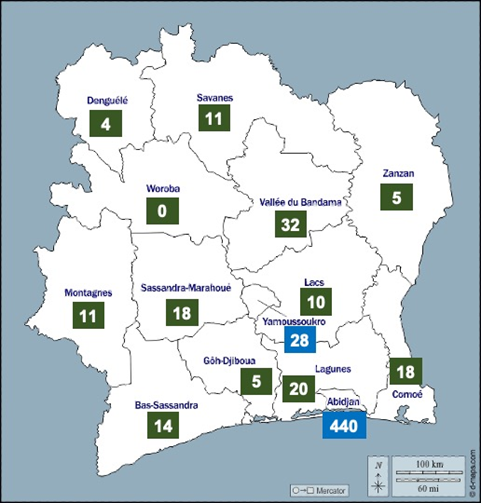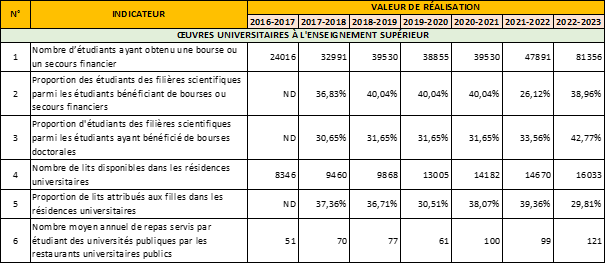Higher Education
VISION, MISSIONS, AND STRATEGIC DEVELOPMENT PILLARS
The Government's vision regarding Higher Education and Scientific Research is to "train high-quality human resources capable of effectively contributing to the socio-economic development of Côte d'Ivoire, and to develop relevant scientific research that can provide solutions to the development challenges facing the country."
The missions assigned to the Ministry responsible for Higher Education and Scientific Research are outlined as follows:
Monitoring the organization and operation of public and private universities and grandes écoles.
Promotion of continuing education in higher education.
Promotion of university professionalization.
Improved management of research and innovation.
Strengthening the capacity for the valorization and dissemination of research results.
Increased and diversified funding sources for research and innovation.
As part of the implementation of its policy for the development of the higher education and scientific research subsector, the government has initiated significant reforms and investments since 2011.
In terms of reforms, the actions focused on:
- Strengthening the legal, institutional, and governance framework:
The key results achieved are:
- The enactment of Law No. 2023-429 of May 22, 2023, concerning Higher Education, Research, and Innovation.
This initiative aims to provide sustainable solutions to the systemic issues within the Higher Education and Scientific Research (HESR) sector. Key challenges include the low interdependence between research and innovation, with higher education serving as the foundational matrix; insufficient autonomy and weak governance of higher education and research institutions; inadequate capacity in public universities; a shortage of qualified educators in certain specialties; low internal and external performance; insufficient funding for higher education; underfunding of research and innovation; inadequate social spending; weak social dialogue; campus violence; and insufficient recognition of research and innovation outcomes.
- The adoption in 2023 of a new status for Higher Education and Research Institutions, specifically the status of Public Administrative Establishment with a Scientific and Technological Character (EPAST).
- The establishment in 2023 of the National Agency for Quality Assurance in Higher Education and Research (ANAQ-ESR) is set to succeed the General Directorate for Quality and Evaluations (DGQE), which was created in 2016. This agency is responsible for evaluating and accrediting programs, research activities, and both public and private higher education and research institutions, with the aim of ensuring the quality of education, research, and innovation.
- The signing of Performance Contracts (PC) between the State and the two public universities.
- The establishment of the Sectoral Committee for Social Dialogue of the Ministry of Higher Education and Scientific Research (MESRS) was formalized by decree n°969/MESRS/CAB dated March 22, 2023, which appointed the members of said Sectoral Committee.
- The development of a training program that promotes the professional integration of graduates.
The adoption of the License-Master-Doctorate (LMD) system in 2012-2013.
The revision of numerous curricula for public university training programs.
- The educational reform of two schools at INP-HB, specifically the Higher School of Public Works (ESTP) and the Higher School of Commerce and Business Administration (ESCAE), has led to (i) the attainment of CTI certification (Commission des Titres d’Ingénieurs) and (ii) the modernization of the academic curricula of these two institutions.
- The development of distance learning.
- The adoption of the reform of Doctoral Schools in July 2023 aims to (i) harmonize the process of creating and accrediting Doctoral Schools to ensure the quality of doctoral training and support the professional pathways of post-doctoral researchers, and (ii) establish training and research structures that integrate research institutions, higher education schools, and businesses, centered around a doctoral training program encompassing one or more specialties within a given field of study, with the objective of conducting research that addresses local needs and is more aligned with the business world.
In terms of investments, the Government continues its extensive program for the development of Higher Education and Research infrastructure. The results achieved in this context are:
- The rehabilitation, expansion, and equipping of public universities (UFHB, UAO, UNA, UJLoG, and UPGC), INP-HB, and ENS.
- The construction of four new universities, including the Virtual University of Côte d'Ivoire (UVCI), the University of Man (UMAN), the University of San-Pedro (USP), and the University of Bondoukou (U-Bondoukou).
- The rehabilitation and equipping of university residences and restaurants in Abidjan and Bouaké.
- The construction of new university residences and restaurants in Abidjan, Man, Daloa, Korhogo, San-Pedro, and Bondoukou.
2. Higher Education System
- University Card
The University Card of Côte d'Ivoire comprises universities and grandes écoles whose activities are directed and supervised by the relevant ministry, specifically the Ministry of Higher Education and Scientific Research.
Between 2013 and 2023, the higher education landscape experienced significant expansion (see Tables 1.1 and 1.2). The number of public universities nearly doubled, increasing from 5 to 9, with the establishment of the Virtual University of Côte d'Ivoire (2016) and the universities of Man (2016), San-Pedro (2021), and Bondoukou (2023). In the private higher education sector, the number of institutions tripled. There were 571 private institutions in 2022-2023 compared to 189 in 2013-2014, representing a growth of 202%.
Evolution of the number of higher education institutions by type and status from 2013 to 2023.


Source : MESRS / Databases
Evolution of the number of higher education institutions by status and type from 2013 to 2023.


Source : MESRS / Databases
The geographical distribution of higher education institutions indicates that all districts have at least one higher education establishment, with the exception of the Woroba District. The Autonomous District of Abidjan represents a zone of very high concentration, housing 440 universities and grandes écoles, accounting for 71.43%. This is followed by the districts of the Bandama Valley, Yamoussoukro, and the Lagunes, which have 32, 28, and 20 establishments respectively, representing 5.19%, 4.55%, and 3.25% of the universities and grandes écoles in Côte d'Ivoire.
Distribution of Higher Education Institutions by Type and Status According to Geographic Area in 2022-2023.


Source: MESRS / Databases
Distribution of Higher Education Institutions by Status and Type According to Geographic Area in 2022-2023.


Source : MESRS / Databases
Geographical distribution of higher education institutions

Source : MESRS / Databases
In addition to academic infrastructure, the higher education system includes social facilities managed by the Regional University Works Centers (CROU). These facilities, which aim to provide better study and living conditions for students, consist of 31 university residences and dining halls located in Abidjan, Bondoukou, Bouaké, Daloa, Korhogo, Man, San-Pedro, and Yamoussoukro.
In 2023, the accommodation capacity of university residences was estimated at 16,033 beds, and 13,401,430 meals were served in university restaurants, targeting 110,815 students from public universities and grandes écoles under the supervision of the Ministry of Higher Education and Scientific Research (resulting in an average annual number of 121 meals served per student).
Evolution of indicators for monitoring university works

Source : MESRS/Results Indicator Monitoring Matrix (RIMM)
2.2 Data on enrollment (student population)
From 2012 to 2023, the student population experienced significant growth, increasing from 169,946 to 317,636 individuals, representing a rise of 86.9% and an Average Annual Growth Rate (AAGR) of 6.45% over the period.
In 2023, public higher education institutions recorded a total of 171,459 students, up from 87,756 in 2013, representing a variation of 95.38% and a compound annual growth rate (CAGR) of 6.93% from 2013 to 2023. In the same period, private institutions experienced a 77.85% increase in student enrollment, with a CAGR of 5.93%, rising from 82,190 students in 2013 to 146,177 in 2023.
Evolution of student enrollment in universities and grandes écoles by type and status from 2013 to 2023


Source : MESRS/Statistical directories
Evolution of student enrollment in universities and grandes écoles by type and status from 2013 to 2023.


Source : MESRS/Statistical directories
In 2023, the geographical distribution of student population data indicates significant pressure on the autonomous district of Abidjan. Specifically, there are 222,344 students enrolled in universities and higher education institutions in Abidjan, accounting for 70% of the country's total student population. The districts of the Bandama Valley and the Savannas rank second and third, with 39,800 and 14,398 students respectively, representing 12.53% and 4.53% of the student population.
General trends are detailed in the tables below according to the type and status of the establishments.
Distribution of student populations in universities and grandes écoles by type and status according to geographic area for the academic year 2022-2023


Source : MESRS/Statistical directories
Distribution of student populations in universities and grandes écoles by status and type according to geographical area for the academic year 2022-2023


Source : MESRS/Statistical directories
Training pathways in Higher Education are categorized into 11 fields, according to the International Standard Classification of Education (ISCED), defined as follows:
Agriculture, Forestry, Fisheries, and Veterinary Sciences;
undefined Commerce, Administration, and Law;
undefined Education; undefined Engineering, Manufacturing Industries, and Construction;
undefined Humanities and Arts; undefined Generic Programs and Certificates;
undefined Health and Social Protection; undefined Natural Sciences, Mathematics, and Statistics;
undefined Social Sciences, Journalism, and Information;
undefined Services;
and undefined Information and Communication Technologies.
For the academic year 2022-2023, the predominant fields of study are (i) Commerce, Administration, and Law (113,589 students), (ii) Health and Social Protection (41,028 students), and (iii) Letters and Arts (32,255 students), representing 35.76%, 12.92%, and 10.15% of the student population, respectively.
Students enrolled in fields related to Science, Technology, Engineering, and Mathematics (STEM), excluding Health Sciences, account for 24.36% of the total student population. Specifically, there are 27,826 students registered in Engineering, Manufacturing, and Construction; 19,873 in Natural Sciences, Mathematics, and Statistics; 17,763 in Information and Communication Technologies; and 11,926 in Agriculture, Forestry, Fisheries, and Veterinary Sciences.
Distribution of student enrollment in universities and grandes écoles by type and status according to the field of study for the academic year 2022-2023


Source : MESRS/Statistical directories
Distribution of student enrollment in universities and grandes écoles by type and status according to the field of study for the academic year 2022-2023


Source : MESRS/Statistical directories
2.3 Data on educational supervision (teaching staff)
The educational supervision of students during the 2022-2023 academic year was provided by 26,402 teachers, including 8,201 in public institutions and 18,201 in private sector establishments.
The student-to-faculty ratio in public universities and grandes écoles under the Ministry of Higher Education has significantly improved in recent years. It decreased from 25 in the 2018-2019 academic year to 20 in the 2022-2023 academic year.
This improvement in the student-to-faculty ratio is the result of government efforts, which have involved the recruitment of over 600 teaching researchers and similar positions annually for the past five years.
Evolution of the teaching staff in universities and grandes écoles by type and status over the period 2013-2023


Source : MESRS/Statistical directories
Evolution of the teaching staff in universities and grandes écoles by status and type from 2013 to 2023


Source : MESRS/Statistical directories
Some monitoring indicators for the Higher Education and Scientific Research subsector

Source : MESRS/Results Indicator Monitoring Matrix (RIMM)
